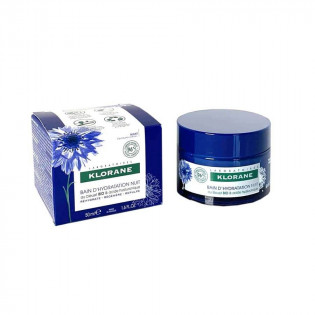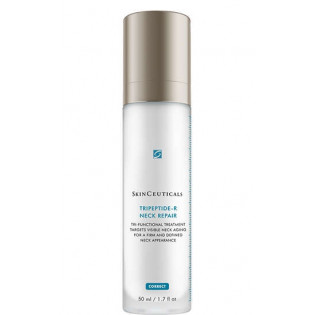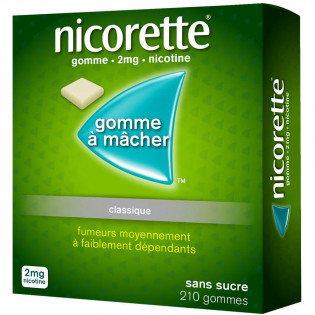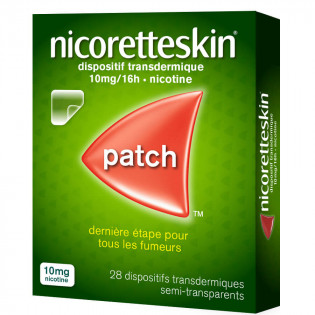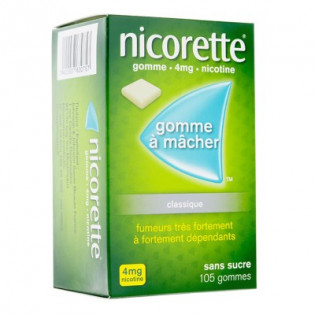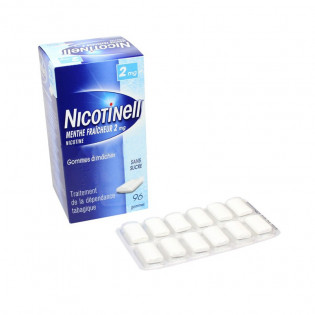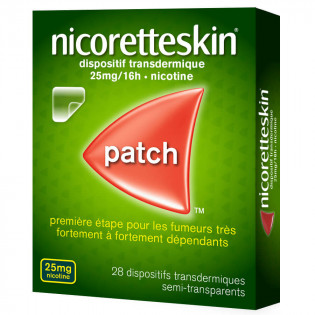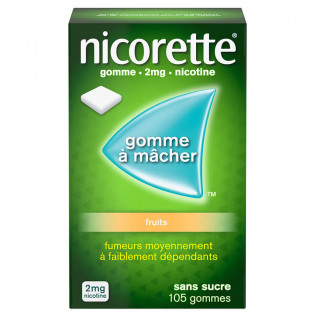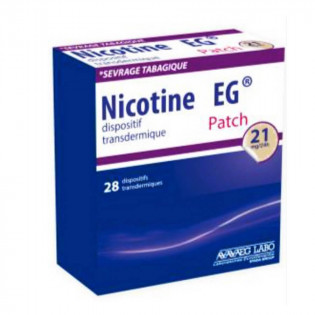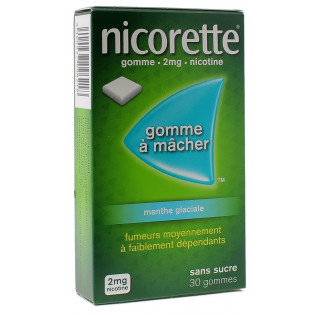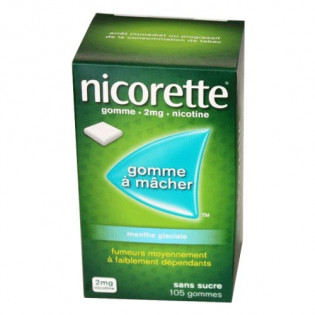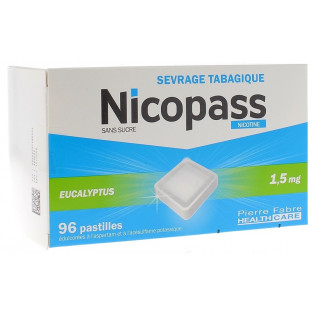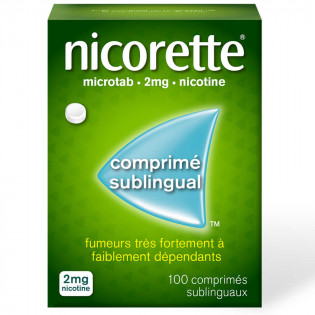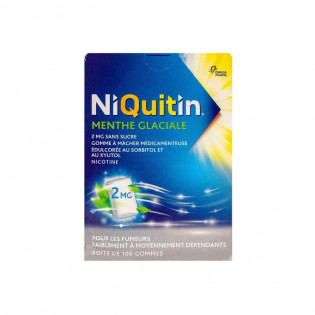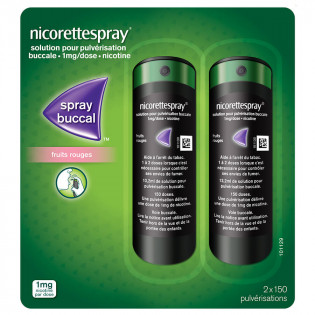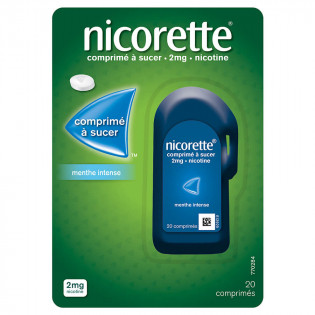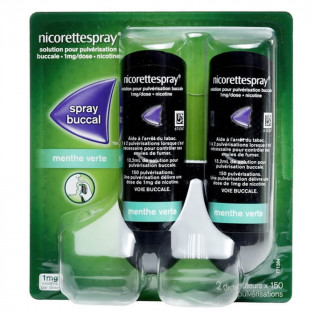When is NICORETTE Inhaler indicated?
This medication helps smokers to detoxify from tobacco or to better cope with a temporary period when they cannot or should not smoke.
While the method of inhalation is similar to smoking a cigarette, the mechanism of nicotine absorption is different: the pad in the cartridge releases a small dose of nicotine with each inhalation, which does not reach the lungs, but is deposited in the mouth. The nicotine is then slowly absorbed by the oral mucosa. This absorption mechanism is therefore closer to that of pipe or cigar smokers who do not swallow the smoke. It is also similar in its effect to the use of nicotine-containing chewing gum. Inhaling the smoke from a cigarette allows for immediate absorption of nicotine and a rapid rise in its blood level.
This succession of blood peaks and strong variations in nicotine levels are part of the mechanisms that maintain tobacco addiction. On the contrary, this device, like chewing gum or patches, provides much more stable blood levels and facilitates the cessation of nicotine addiction. It is therefore not necessary to expect to find with the inhaler the same sensations as those obtained with tobacco: the blood levels of nicotine obtained with this substitute are about 1/3 of those obtained with a cigarette.
This medicine can be used either to stop smoking permanently or to stop smoking temporarily.
Open the device by aligning the markings on each of its two parts
Take a sealed cartridge from the blister pack and press it firmly into the lower part of the device until the protective film breaks
Insert the upper part of the device by aligning the marks again and bring the two parts together (opening the other end of the cartridge)
Rotate one part relative to the other to misalign the marks and lock the device
Normal use of a new cartridge is 20 minutes in one continuous heavy use, and up to 4 times 20 minutes in light, intermittent use
Usual dosage
Complete smoking cessation
For this purpose, the treatment of nicotine dependence usually follows 2 phases: for 3 months, use a cartridge each time the urge to smoke arises, not to exceed 12 cartridges per day.
This 3-month period may vary from person to person and its end corresponds to a strong decrease or disappearance of the desire to smoke. The second phase, which lasts 6 to 8 weeks, corresponds to a progressive reduction in the number of daily cartridges, until cessation.
The treatment should not exceed 6 months in total. The inhaler can be used alone or in combination with Nicorette transdermal devices. In this case, treatment starts with a 15 mg/16 h transdermal device, usually combined with 4 or 5 cartridges of inhaler per day.
In a second phase, lower-dose transdermal devices are used progressively: 10 mg/16 h devices for 3 to 6 weeks, then 5 mg/16 h devices for 3 to 6 weeks, while continuing to use the same number of 10 mg cartridges as at the beginning of treatment.
Temporary smoking cessation :
The principle is the same, but the duration of treatment depends on the context that necessitated temporary smoking cessation
Reduction of tobacco consumption
Use the inhaler as soon as the urge to smoke arises in order to reduce cigarette consumption as much as possible and remain as long as possible without smoking. The number of cartridges to be used per day varies but should not exceed 12
If a significant reduction in cigarette consumption has not been achieved after 6 weeks of treatment, it is recommended to seek medical advice. The aim of the reduction in the number of cigarettes is to eventually achieve a complete cessation of smoking, which should be attempted as soon as possible, necessarily within the first 6 months of treatment. It is not recommended to continue the treatment for more than 12 months.
Advice
After opening, any cartridge must be used within 12 hours. This medicine can be used by smokers without medical consultation, it is available over the counter. Your pharmacist's advice is invaluable; he or she will be able to help you determine the best time to stop smoking and explain the causes of failure. Nicotine taken orally as a replacement for cigarettes is as harmful to the cardiovascular system as the nicotine contained in tobacco. Only the risk of lung cancer disappears. When smoking cessation is motivated by urgent medical reasons: recent infarction, arteritis, gastritis or ulcer, it is preferable to stop taking nicotine in all its forms. Like all anti-smoking methods used to help smokers, this medication can only be effective when the desire to stop smoking is personal and accompanied by a strong motivation. It is this motivation that will allow you to fight against the desire to smoke, without being forced to constantly call upon your willpower, which becomes blunted over time. A smoker who wants to stop smoking for good must consider tobacco as a poison, an unacceptable addiction. They must come to terms with the fact that they will never smoke again, right from the start of the withdrawal process. Each day without tobacco should be experienced as a liberation, not as an ordeal. The smoker who is in this frame of mind is a good candidate for permanent cessation. Stopping smoking, which is a real drug, leads to many problems: weight gain is frequent, concentration problems can last several weeks. A slight depressive state is possible. Weight gain must be combated by a diet, and if possible by a sports programme which has the advantage of reconciling the smoker with his body. Do not hesitate to consult your doctor in case of difficulty; his advice and experience will be precious in the fight against relapse.
- Pregnancy: Smoking during pregnancy can cause a delay in the growth of the foetus. It is therefore always advisable to stop smoking. In women who are heavily addicted to nicotine, the use of this drug can be helpful, but the effects of nicotine alone on the fetus are not well known. This medication has the advantage of not exposing the fetus to the other toxins present in tobacco smoke. In summary: if the ideal is not to smoke and not to expose the fetus to nicotine inputs, the use of this medicine is a lesser evil compared to tobacco
- Breastfeeding: Nicotine passes into breast milk, breastfeeding is not recommended during treatment. If breastfeeding is nevertheless chosen, use the device preferably after suckling.
- Pregnancy: Smoking in pregnant women can cause fetal growth retardation. It is therefore always advisable to stop smoking. In women who are heavily addicted to nicotine, the use of this drug can be helpful, but the effects of nicotine alone on the fetus are not well known. This medication has the advantage of not exposing the fetus to the other toxins present in tobacco smoke. In summary: if the ideal is not to smoke and not to expose the fetus to nicotine inputs, the use of this medicine is a lesser evil compared to tobacco
- Breastfeeding: Nicotine passes into breast milk, breastfeeding is not recommended during treatment. If breastfeeding is nevertheless chosen, use the device preferably after suckling.
This medication should not be used in non-smokers or occasional smokers. Caution In the perspective of a definitive detoxification, stopping smoking is a necessary condition for the success of the treatment. A medical opinion is necessary in case of stomach or duodenum ulcer, severe liver or kidney failure, asthma, chronic throat disease. Do not use other medications containing nicotine, including transdermal devices, without medical advice. As some medications are more rapidly broken down by the liver in smokers, their effect may be increased at the beginning of smoking cessation (see Drug Interactions). Nicotine is a toxic substance. Do not leave new or used cartridges within the reach of children. This medicine is only for use by adults and adolescents over 15 years of age.
The products contained in tobacco smoke can accelerate the rate of elimination of certain drugs, particularly theophylline. When you stop smoking, the effect of these drugs may be reinforced and signs of overdose may appear. Contact your doctor if you have any doubts.
- Pregnancy: Smoking during pregnancy can cause fetal growth retardation. It is therefore always advisable to stop smoking. In women who are heavily addicted to nicotine, the use of this drug may be helpful, but the effects of nicotine alone on the fetus are not well known. This medication has the advantage of not exposing the fetus to the other toxins present in tobacco smoke. In summary: if the ideal is not to smoke and not to expose the fetus to nicotine inputs, the use of this medicine is a lesser evil compared to tobacco
- Breastfeeding: Nicotine passes into breast milk, breastfeeding is not recommended during treatment. If breastfeeding is nevertheless chosen, use the device preferably after suckling.
This medication should not be used in non-smokers or occasional smokers. Caution In the perspective of a definitive detoxification, stopping smoking is a necessary condition for the success of the treatment. A medical opinion is necessary in case of stomach or duodenum ulcer, severe liver or kidney failure, asthma, chronic throat disease. Do not use other medications containing nicotine, including transdermal devices, without medical advice. As some medications are more rapidly broken down by the liver in smokers, their effect may be increased at the beginning of smoking cessation (see Drug Interactions). Nicotine is a toxic substance. Do not leave new or used cartridges within the reach of children. This medicine is only for use by adults and adolescents over 15 years of age.
The products contained in tobacco smoke can accelerate the rate of elimination of certain drugs, particularly theophylline. When you stop smoking, the effect of these drugs may be reinforced and signs of overdose may appear. Contact your doctor if you have any doubts.
Headaches, throat irritation, nausea, vomiting, hiccups, stomach pain, cough, nasal congestion, sinusitis; these disorders are caused by nicotine. Rarely (less than 1% of subjects): palpitations, sleep disorders, dizziness, mouth ulcers.
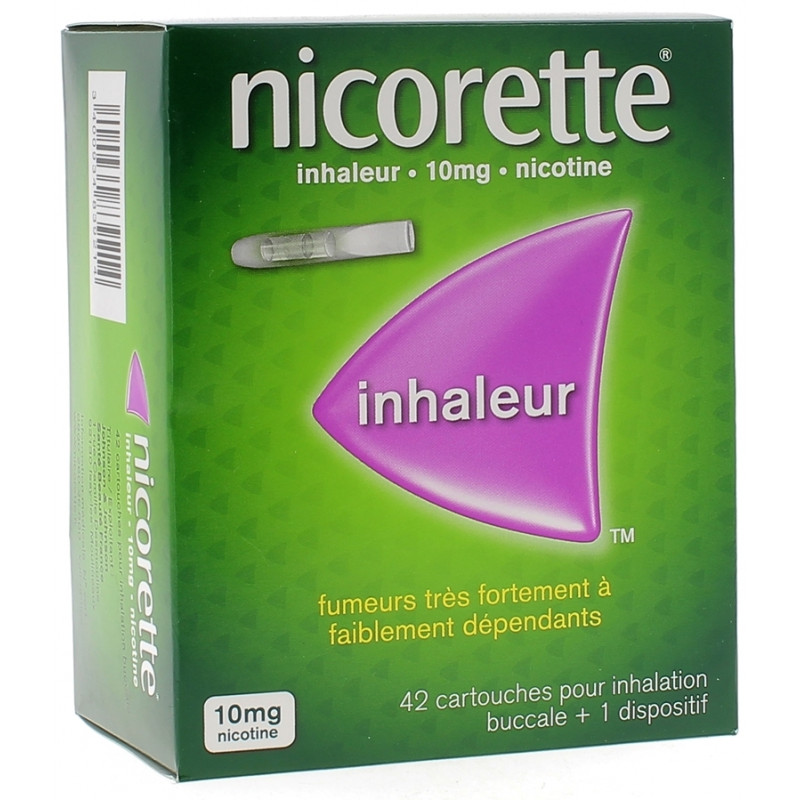
 Français
Français English
English
